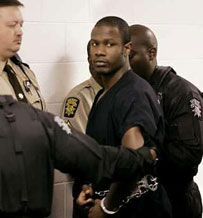|  | 
 April 18, 2005 April 18, 2005 |
"Suspect" Brian Nichols returns to the courthouse/scene of his last crime under close watch by court officials/potential victims.
While his attorneys very politely reminded him he could only plead "guilty" or "not guilty," though "not guilty" seemed an extremely unlikely choice, Nichols laughed off his odd feeling of having been through it all before.
"Sorry," the very large former linebacker told the court, as they listened with wide eyes and trembling lips. "It's just like, wow, I feel like I've been here before in some way. I have this whole memory of struggles with officers and gunfi...
rian Nichols, the world's most rightfully-imprisoned black man, appeared Friday in the same courthouse where he killed three people on March 11 in Fulton County, Georgia. Asked to enter his plea by a very timid judge, surrounded by trigger-happy bailiffs and police, Nichols pleaded "déjà vu" in his case.
While his attorneys very politely reminded him he could only plead "guilty" or "not guilty," though "not guilty" seemed an extremely unlikely choice, Nichols laughed off his odd feeling of having been through it all before.
"Sorry," the very large former linebacker told the court, as they listened with wide eyes and trembling lips. "It's just like, wow, I feel like I've been here before in some way. I have this whole memory of struggles with officers and gunfire and—anyway… guess we should get to trial and stuff. So, who's the misguided people who are going to testify against me?"
The judge, who asked not to be identified or even revealed to the suspect, addressed the court from inside a large crate he or she had hauled up behind the bench, and suggested they put off the proceedings and gave the prosecutors a chance to build up a rock-solid case against the defendant—who, the judge acknowledged, certainly may very well not be guilty, for all we know.
A little more than a month ago, the gigantic nasty African-American Hannibal Lecter wrestled out of custody of court officers, secured a gun, and shot three people, including a judge, before making his way outside for a spree of carjackings and hostage-taking that eventually ended in his arrest. Numerous charges were added to Nichols' already long list, which included rape, aggravated sodomy, and false imprisonment, the charges of the previous trial where the convicted badass attacked the court. It was the second trial on the charges for Nichols, after the first trial ended when the jury couldn't come to a decisive verdict.
"Boy, I feel like quite the ass now," admitted one of the holdout jurors from the first trial, who asked to remain anonymous out of embarrassment and fear of possibly being killed. "I owe a few of my fellow jurors some apologies now, that's for sure. Back then I sure didn't think him capable of rape and kidnapping, but now that I think about it, I was worried about him leaping into the jury box and bludgeoning me to death. I just assumed the two were mutually exclusive."
Court officials took no chances with Nichols this time, bringing the besuited behemoth into court in leg irons, shackles, and wearing a global positioning device on his ankle that would self-destruct upon walking out of the courthouse area. For extra safety measures, the gray suit Nichols wore was also packed with gunpowder by deputies and a twenty-foot fuse trailed behind him, just in case he tried to make another break for it.
Bailiff Vigo Metzel was in charge of Nichols' secure transportation to and from the courthouse.
"Some of us wanted to give him one of those half-hockey masks to keep him from eating people, but we thought that just made him look even more terrifying. No one would want to be on the security detail then. Besides, no one would volunteer to put the mask on him."
When questioned as to why anyone would want to defend a client with so much stacked against them, including verifiable security footage from the very court where he's going to be tried, Nichols' attorneys, who also asked not to be identified, said that even though it was unlikely Nichols would go free, they wanted Nichols to know definitively whose side they had been on in the event he ever breaks out again.
In the meanwhile, Nichols has privately told his attorneys and the prosecution that he only made his escape attempt from the courthouse in March so he could find the real perpetrators of the crimes of which he was accused. If he had found them, Nichols said, he certainly would have killed them, too. the commune news tried a similar chaotic courtroom breakout, but when it failed, we were forced to pay the traffic violation anyway. Shabozz Wertham claimed for the first time ever he didn't want to play the race card in this case, and in fact wanted to stay as far away from the big scary black man as he could.
 |
Clash of the Titans 2: Every Which Way But Zeus Greenlit
 Lost Scout Earns Coveted "Distract the National Media" Badge
Michael Powell leaving FCC; sick of hearing word "titties" on daily basis
Man who thinks like wife-killing ex-cop needed to catch wife-killing ex-cop
|
Lost Scout Earns Coveted “Distract the National Media” Badge House Democrats Uneasy During Rare Trip Outside Big Ratings Prompts ABC to Seek More Dancing Handicapped Shows Strychnine Dog Food: Where Can You Buy It? |
|  |
 | 
 October 1, 2001
Rubber Ain't My BrotherTime to set the record straight, Pop'n Fresh. Who's in the kitchen with Dinah? Neddikins Nedmiller, them's the cat! Surprise! Long time this mystery puzzled them noodles of them noodle-headed school marmots. "Whoozit?" they askin. "Whoozat strummin that banjo?". Sure ain't Poor Henry, nor Lonesome Tom, them out trappin' coons! Sures ain't Fat Teddy Wedkins, him out eatin' pies offa windowsills. Ain't neither Ralf the cat-eater nor Surly Joe, them went to town for the bark-strippin contest. "Whoosat leave left?" them melon-headed childrens askin. "Who's in that kitchen we know?". Well the time's up, you paint-eatin' imbeciles, and Neddy's left holdin the banjo. You all owe me a nickel.
Summertime's the time Ned likes to strap on a pair of latex jogging trunks and hit the slopes, them Korean bastards took Ned's tonsils in the great war. Rub-a-dub-dub there's a shark in my tub, that's what I always say! Memorial Day's the time to remembrin all them things you never remembered, like gettin' your porcupine sharpened or where you left your mother that cold wintry day. Veteran's day's the time when you take your horse in to get his elbows checked for white dwarfs, that's the day.
Newsflash! Sub sandwiches float! Jig's up, Kruschiev!
When Nedinski was six years old of the equinox, his momma take him out in the deep woods of them black forest to teach him 'bout them magic-talkin tree midgets. Ned learn that day 'bout the city of them trees, and them...
º Last Column: Lost My Way on the Slow Gray Train
º more columns
Time to set the record straight, Pop'n Fresh. Who's in the kitchen with Dinah? Neddikins Nedmiller, them's the cat! Surprise! Long time this mystery puzzled them noodles of them noodle-headed school marmots. "Whoozit?" they askin. "Whoozat strummin that banjo?". Sure ain't Poor Henry, nor Lonesome Tom, them out trappin' coons! Sures ain't Fat Teddy Wedkins, him out eatin' pies offa windowsills. Ain't neither Ralf the cat-eater nor Surly Joe, them went to town for the bark-strippin contest. "Whoosat leave left?" them melon-headed childrens askin. "Who's in that kitchen we know?". Well the time's up, you paint-eatin' imbeciles, and Neddy's left holdin the banjo. You all owe me a nickel. Summertime's the time Ned likes to strap on a pair of latex jogging trunks and hit the slopes, them Korean bastards took Ned's tonsils in the great war. Rub-a-dub-dub there's a shark in my tub, that's what I always say! Memorial Day's the time to remembrin all them things you never remembered, like gettin' your porcupine sharpened or where you left your mother that cold wintry day. Veteran's day's the time when you take your horse in to get his elbows checked for white dwarfs, that's the day. Newsflash! Sub sandwiches float! Jig's up, Kruschiev! When Nedinski was six years old of the equinox, his momma take him out in the deep woods of them black forest to teach him 'bout them magic-talkin tree midgets. Ned learn that day 'bout the city of them trees, and them midgets who frolic and play there with them tree rats, and them scream like freight trains and fling their scat like Sandy Kofax when they're sad. Ned learn that day not to make the tree midgets sad, so today he passes that wisdom on to you. Don't make them tree midgets sad. Ned remember them summertimes when he was knee-high to a boa constrictor, runnin' round in the yard like a Chinaman celebratin' China Day. None of them neighborhood families had money for none of them Water Witch lawn toys or no Crazy Clown neither, so Neddy and his buddies Ron-Ron and The Gooch would tie the garden hose to that epo-leptic kid Stanley and chase him 'round with flashlights, turning 'em on and off an off an on until he'd start doin' the 'lectric wiggle like a honeybee mappin' out the way to the treasure. Then we frolic and play in the water, til them vultures start to circle overhead. That's when it's time for some chocolate milk 'n grape nuts, by gum. Summertime's also the time for them eye-bogglin' great scientific advances, like Nedmiller's beach catapault. Nothin' quite matched the joy wrapped up inna small boy's scream as he's rocketed out of his swim jimmies and kerplunked into the ocean 'bout a quarter mile out to sea. Also works for family dogs, too, but warning: NASA loses their sense of humor faster than a jellyfish in a weasel condom when they pick up flying schnauzer formations on their radarmascope. This year Nedrums is workin' on his sister-invention, the sea-catapault! Doublin' the pleasure 'n fun when you see sharks and manta rays and small whales flung up onto the beach and highway! Hot damn! Back to the lab with Neddington P. Bear! Lotsa hours to spend, wrappin' malamutes in apple cores and Polydent, and checkin' the summer sausage for a hernia. I hope the best to you and yours with your summer projects, and may all your hornet's nests be kosher! TTFN! º Last Column: Lost My Way on the Slow Gray Trainº more columns
| 
|  April 1, 2002
Queen of the Doomed RelationshipThe showbiz life can wreak havoc on your love life. Havoc? A "c," no "k"? That never looks right. But it's true. Havoc or havock.
Having the necessary charisma and magnetism to make it big in the entertainment world is no guarantee you'll be successful at love. In fact, in my world it's been the opposite case. All my relationships have fizzled into burnt marshmallows at the bottom of a pissed-out campfire.
My first boyfriend was my third agent, let's just call him Mort R., for the sake of confidentiality. Old Rothstein, that's what I always called him, he was a sucker for girls who looked young. And I looked young, being 12 at the time, so we were a perfect match. We had everything in common, we both liked McDonald's and Alf, we both wanted kids. Well, he didn't want kids the same way I wanted kids, but we were working through our problems when my parents and his wife made us break up. You may have seen the news article in The Star or the Fox movie of the week. They could have at least done me a favor and cast me as myself, I definitely know the part.
I didn't have a real serious boyfriend again until I was 15. We were married in California, only to find out Reverend Jughead didn't have state sanctioning so it never was legal. When we found that out, things just disintegrated. That and one argument about what constitutes "enough" oral sex and the storybook romance was over. Yeah, a storybook—the title of this story was "Sleeping...
º Last Column: The "M" Stands for Music!
º more columns
The showbiz life can wreak havoc on your love life. Havoc? A "c," no "k"? That never looks right. But it's true. Havoc or havock.
Having the necessary charisma and magnetism to make it big in the entertainment world is no guarantee you'll be successful at love. In fact, in my world it's been the opposite case. All my relationships have fizzled into burnt marshmallows at the bottom of a pissed-out campfire.
My first boyfriend was my third agent, let's just call him Mort R., for the sake of confidentiality. Old Rothstein, that's what I always called him, he was a sucker for girls who looked young. And I looked young, being 12 at the time, so we were a perfect match. We had everything in common, we both liked McDonald's and Alf, we both wanted kids. Well, he didn't want kids the same way I wanted kids, but we were working through our problems when my parents and his wife made us break up. You may have seen the news article in The Star or the Fox movie of the week. They could have at least done me a favor and cast me as myself, I definitely know the part.
I didn't have a real serious boyfriend again until I was 15. We were married in California, only to find out Reverend Jughead didn't have state sanctioning so it never was legal. When we found that out, things just disintegrated. That and one argument about what constitutes "enough" oral sex and the storybook romance was over. Yeah, a storybook—the title of this story was "Sleeping Beauty and the Prince Charming Who Violated Her Before She Woke Up."
For years I just had little flings here and there, sometimes for days at a time. But I couldn't land a real boyfriend, it was like I had herpes or something. I mean, I did, but it was like everyone knew it. And I don't care what anyone says, they do go away, that is the biggest myth I ever heard.
Then at 22, I met the nicest guy on the face of the earth. No, not Bob Ross, I think he was already dead by this time. I met my boyfriend Spanner. He was a fantastic guy, before he turned into an asshole. He was a professional pool player when I met him, he played in places around the city and got paid for it. I met him playing pool, actually, and we even played for money. It takes him a few games to warm up, but around the third game he turned into a dynamo like instantly! Our sex life was often a mirror of that. Anyway, he didn't like to be called a "pooler" like I used to say, he preferred "hustler." My dad said it wasn't even a real job but I know he was mistaken because I've seen magazines for the profession.
I could go on forever about Spanner. He was sweet, he was handsome, he had a different car every night—everything a girl dreams about. I'm convinced we would've gotten married some day if the lousy cops hadn't sent him to jail for a crime he only did once. I would have gladly waited for him but he started cheating on me with his cellmate, and to make things worse, I didn't even know he was gay. He said he didn't do it voluntarily, but if you think I'm going to believe that, ha! Why didn't he tell the guards or ask the guy to stop then?
Yes, boys, my heart's been broken more times than Liz Taylor's elastic waistbands. But as always, I come out landing on my feet. I recently started seeing a charming co-worker of mine here at the commune, Ramon Nootles, and I've got a great feeling about this one. He's already taking me to meet his mother this weekend. At least I think it's his mother, he just kept calling her by her first name, Bunny, and he said he'd thought we'd really get along—he can't wait to watch us.
I may be in love again! º Last Column: The "M" Stands for Music!º more columns
|

|  |
Milestones131 B.C.: Roman inventor Pontius creates love accidentally while trying to come up with a perfume that staves off homosexuality. Anyone who disagrees, we invite them to tell us who created love then.Now HiringBarber. Staff barber sought to keep heads neat and trim, faces clean shaven, and reduce hippieness by at least 30%. Own scissors and weird Vitalis smell a plus. Controversial "tell-it-like-it-is" barbers need not apply.Top Georgian Euphemisms for Evolution| 1. | Satan's Trick | | 2. | How Stuff Grow'd Up | | 3. | Changemification | | 4. | Uppetyupping | | 5. | Magic! | |
|   North Korea Pissed Their Real-Life Hunger Games Nowhere Near as Popular as Movie BY Mrs. Jabonski's Third Grade Class 7/21/2003 America the BeautifartO beautiful farts stained the skies,
For lumber made of brains,
For purple Muppet maggot fleas
A dove went fruity--GAY!
America! America!
God shaves his balls with thee.
And this other dude
Had a brother who'd
Frenched a seal in the slimy sea! Gross!
O beautiful Ford Pinto fire,
And beans that give dogs gas
And fat kids who eat ding dongs
Until they've got a King Kong ass!
America! America!
God shits some grapes on thee.
And stick your butt in a Pizza Hut,
Until they show it on TV!
O beautiful sick weasels peed,
On your grandma's electric fence.
When the smoke cleared the minivan
Was covered in weasel dents!
America! America!
God...
O beautiful farts stained the skies,
For lumber made of brains,
For purple Muppet maggot fleas
A dove went fruity--GAY!
America! America!
God shaves his balls with thee.
And this other dude
Had a brother who'd
Frenched a seal in the slimy sea! Gross!
O beautiful Ford Pinto fire,
And beans that give dogs gas
And fat kids who eat ding dongs
Until they've got a King Kong ass!
America! America!
God shits some grapes on thee.
And stick your butt in a Pizza Hut,
Until they show it on TV!
O beautiful sick weasels peed,
On your grandma's electric fence.
When the smoke cleared the minivan
Was covered in weasel dents!
America! America!
God barfed his brains on thee.
The president kissed a pig for Lent
He thought was the Virgin Mary!
O beautiful retarded flies,
On a seasick lion's mane
For Mrs. Jabonski's bad trick knee
And her husband who is gay! (fruity)
America! America!
God waves his butt at thee.
For the Batmobile did lose a wheel
And the Joker got away! Hey!   |


















